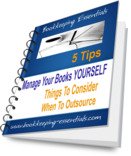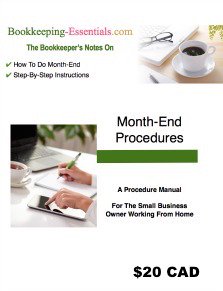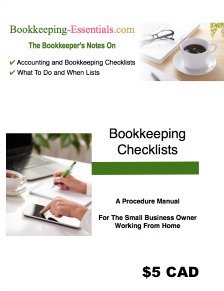Bookkeeping vs Income Tax Reporting
by Nicole
(Alberta)

Bookkeeping is different than tax preparation.
I'm starting my new business with bookkeeping and am kind of having a bit a brain lapse that I'm hoping you can help me with.
I'm mainly familiar with QuickBooks (personally I have no use for Simply/Sage!); however a new client of mine...originally she was using QuickBooks - they had a bookkeeper come in to fix everything and switched to Simply. They weren't happy with this bookkeeper and were wanting me to fix everything as well as continue for them from this point on. Now, since I am much more familiar with QuickBooks, they were agreeable to going back to QuickBooks and they also said that I may need to just start from scratch - from what I can see, she started this company just in Nov. 2011 so it's more or less all of 2012 that I need to worry about.
My concern is, when it's a sole proprietorship and a business run out of your own home - do you record the costs of say...mortgage, utility bills, phone, etc. anywhere? I know this is rather an amateur question to be asking, but I've mainly dealt with small corporations. My issue is, I know that you can claim this sort of thing when filing your income tax, I'm just not sure how/if you record it in your books anywhere.
Another situation that stumped me is when, as an example - say she bought a meal or some office supplies, that surely can be written off in her income taxes but how does that get recorded when it was just paid with cash/personal account. This also goes for the mortgage/utilities; if they are paid with a personal account rather than the business account, how does this get accounted for?
I hope this makes sense, and I really appreciate the last time how you replied so quickly! :D
Thanks again,

Hey Nicole,
I am going to assume you are only doing the bookkeeping and not the income tax preparation. However, sometimes to be a better or great bookkeeper, it helps to know where all your hard work is going to end up ... so we'll talk a bit about taxes for the sole proprietor which is different than tax for a corporation.
Take a look at the CRA tax schedule T2125. You will see a section titled, "Calculation for business-use-of-home expenses". This is where any expenses relating to the running of the home office will be claimed. There is no need for you record any of these tax deductions while doing the bookkeeping for a sole proprietor. It will be handled at tax preparation time.
With regards using personal funds to purchase business expenses ... this is not a great habit to get into. In my chat on audit trails, I talk about how important it is to separate your personal expenses from your business expenses. It not only increases the cost for the client of having their books prepared, it invites CRA to audit your personal expenses during a business audit if/when that happens. It also increases the chances of understating income or overstating expenses ... both no-nos.
That said, the best way to record business expenses paid with personal cash is to start an "Owed to Owner" current liability (credit card type account for ease of reconciliation purposes) in QuickBooks. You can see my thoughts on how to use this account in my chat on audit trails as well. Just type "audit trail" in the site search box and the chat will come up.
There are very specific rules about what types of meal purchases should be recorded in the books. Follow the T2125 link above and look for item 12 under "13 Items That Are NOT Deductible On Form T2125". Then read item 4 further down the page under "8 Tax Deductions With Limitations". Be sure to read the notes on GST and Meals as you need to make some adjustments to your GST/HST return (if they are GST/HST registrants) before you file it.
Good luck!
P.S. I would like to remind you there is a difference between information and advice. The general information provided in this post or on my site should not be construed as advice. You should not act or rely on this information without engaging professional advice specific to your situation prior to using this site content for any reason whatsoever.
Comments for Bookkeeping vs Income Tax Reporting
|
||
|
||
|
||
|
||
|
||
|
||
Enjoy A Tea Break With
Me Today. Let's Chat!
Use the search feature to quickly find the
information you're looking for.
Join Me On Facebook
Help support this site by "liking" me! Here's where I post current information.
Listed Under Websites NOT Local Business.
This website is NOT associated with the business operating in Bonnyville AB.



